|
|
|
Sort Order |
|
|
|
Items / Page
|
|
|
|
|
|
|
| Srl | Item |
| 1 |
ID:
131984
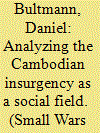

|
|
|
|
|
| Publication |
2014.
|
| Summary/Abstract |
This article investigates power practices in the Cambodian insurgency after 1979 as being part of a social field. There are various types of power practice being exercised by commanders aiming at making soldiers disciplined inside the insurgency. The hypothesis explaining these variations being proposed here is that the type of power being exercised depends on the habitus of the respective commander. Power practices are shaped by the incorporated classificatory discourse of commanders on good soldierhood and leadership. Thereby, armed groups can be analyzed as a social field in which practices are always relational and part of symbolic struggles between different commanders.
|
|
|
|
|
|
|
|
|
|
|
|
|
|
|
|
| 2 |
ID:
084885
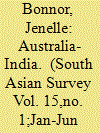

|
|
|
|
|
| Publication |
2008.
|
| Summary/Abstract |
The Australia-India relationship has reached its strongest point for many years, but it is poised at the edge of a difficult issue that may undermine all the hard work. Economic relations are very robust, with Australia's energy supplier role being increasingly important to India. Mutual strategic interests in Asia, the Indian Ocean and counter-terrorism dictate greater focus on the underdeveloped security relationship. But it is the tricky matter of uranium sales that is the big issue in bilateral relations. It has the potential to create a major rupture if a mature accommodation is not reached. Australia and India could develop a stronger and broader partnership that will benefit both but the uranium issue will be a significant challenge to overcome on the way.
|
|
|
|
|
|
|
|
|
|
|
|
|
|
|
|
| 3 |
ID:
116684
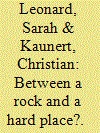

|
|
|
|
|
| Publication |
2012.
|
| Summary/Abstract |
This article focuses on the financial sanctions adopted by the European Union (EU) against individuals suspected of involvement in terrorist activities. This sanctions regime has been sharply criticised for its negative impact on human rights and has seen several judicial challenges before the European Courts. In contrast with most of the existing literature, which focuses on legal issues or examines the consequences of the EU financial sanctions, this article takes a step back to examine the reasons for which the EU decided to adopt these controversial financial sanctions in the first place. This article argues that it is mainly its commitment to 'UN-centred effective multilateralism' that has led the EU to adopt these financial sanctions measures in order to align itself with the UN financial sanctions regime. However, the Kadi landmark ruling of the European Court of Justice (ECJ) has challenged the pre-eminence of multilateralism over other considerations, such as the respect for human rights. As the Court of Justice prepares to hand down its second judgment in this case, the EU is left torn between its commitment to multilateralism and its commitment to human rights, which can be fully reconciled only if the UN sanctions regime meets the EU's human rights standards.
|
|
|
|
|
|
|
|
|
|
|
|
|
|
|
|
| 4 |
ID:
092462
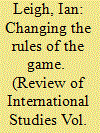

|
|
|
|
|
| Publication |
2009.
|
| Summary/Abstract |
This article argues that there is a need to modernise the law governing accountability of the UK security and intelligence agencies following changes in their work in the last decade. Since 9/11 the agencies have come increasingly into the spotlight, especially because of the adoption of controversial counter-terrorism policies by the government (in particular forms of executive detention) and by its international partners, notably the US. The article discusses the options for reform in three specific areas: the use in legal proceedings of evidence obtained by interception of communications; with regard to the increased importance and scle of collaboration with overseas agencies; and to safeguard the political independence of the agencies in the light of their substantially higher public profile. In each it is argued that protection of human rights and the need for public accountability requires a new balance to be struck with the imperatives of national security.
|
|
|
|
|
|
|
|
|
|
|
|
|
|
|
|
| 5 |
ID:
097918
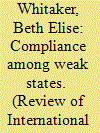

|
|
|
|
|
| Publication |
2010.
|
| Summary/Abstract |
This article examines levels of compliance with the counter-terrorism regime in Africa, where weak states might have been expected to conform. Instead, even under American pressure, some governments have seized the anti-terrorism rhetoric while others have been more reluctant. A comparative analysis of Kenya, Tanzania, and Uganda demonstrates that domestic political factors largely explain this variation; compliance is highest in countries with the least democratic institutions and minimal mobilisation of domestic constituencies. Aid dependence and the perception of a terrorist threat also play a role. To the extent that popular pressures in transitional democracies reduce compliance, the article raises questions about the legitimacy and effectiveness of the counter-terrorism regime.
|
|
|
|
|
|
|
|
|
|
|
|
|
|
|
|
| 6 |
ID:
101011
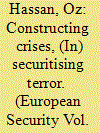

|
|
|
|
|
| Publication |
2010.
|
| Summary/Abstract |
The European Union's (EU) counter-terrorism strategy has been particularly dynamic, developing as a result of 'crises' and subsequent post-crisis narrations. The events of 11 September 2001, and the Madrid and London bombings have proved to provide moments of punctuation from which policy evolution and institutionalisation has followed. As a result of such crises, the EU has increasingly regarded terrorism as a direct challenge to the Union's role as a security actor and sought to institutionalise a diverse range of security governance technologies across its multiple pillars. Such an approach is noticeable for its qualitative difference compared to EU strategy pursued throughout the end of the twentieth century, and demonstrates an increased willingness for the EU to assert its role in the world. Yet, what is highly noticeable from the EU strategy and the proliferation of security governance technologies is the manner in which the EU has securitised 'terrorism' in the pursuit of internal, external and normative objectives. As a consequence, the EU has inflated the threat posed by terrorism, and increasingly attempted to 'Europeanise' its response. Evident in such a strategy however, is the manner in which counter-terrorism practices can generate greater insecurity inside and outside of the Union.
|
|
|
|
|
|
|
|
|
|
|
|
|
|
|
|
| 7 |
ID:
093365
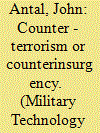

|
|
|
| 8 |
ID:
178019
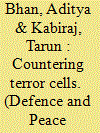

|
|
|
|
|
| Summary/Abstract |
The analysis provides insights regarding the suitability of offensive versus defensive measures in countering a terror cell. It is shown that the optimal resource allocation is more offensive when the cell is aware of which targets have been protected, but does not distinguish between the values of different targets; than the case where it neither distinguishes between target values nor is the protection conspicuous. Also, the ability of the terror cell to inflict damage is least when it neither distinguishes between target values nor is the target protection conspicuous, and most when it shares the counter-terrorists’ target valuations and observes target protection. Hence, from the counter-terrorism (CT) point of view, there seems to be a rationale in making CT target valuations and target protection inconspicuous to the extent possible. The paper finally deals with the possibility of diverging target valuations from the CT standpoint and that of the terror cell and shows that if target protection is conspicuous to the cell and these are common knowledge, then the optimal CT allocation is at least as offensive as the case with identical valuation rankings.
|
|
|
|
|
|
|
|
|
|
|
|
|
|
|
|
| 9 |
ID:
115715
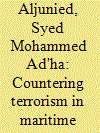

|
|
|
|
|
| Publication |
2012.
|
| Summary/Abstract |
There are two main approaches in the global war on terrorism (GWOT). On the one hand, the hard approach entails physical engagements which cripple destructive plans by terrorists, such as bombings. Through the legislative, judiciary and executive arms of the state, the modern state uses methods such as arrest, surveillance, intelligence and detention to cripple damaging initiatives by terrorists. The soft approach, on the other hand, attempts to debase terrorist ideology through a counter-ideology discourse against radical ideologies which encourage political violence. Through the soft approach, Muslim organizations and leaders debunk terrorist's ideology of hate and violence. This article attempts to elucidate efforts made by governments, and of particular interest are contributions made by Muslim leaders in maritime Southeast Asia to counter the ideology and activities of terrorism.
|
|
|
|
|
|
|
|
|
|
|
|
|
|
|
|
| 10 |
ID:
106545
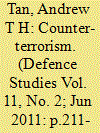

|
|
|
| 11 |
ID:
088776
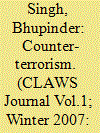

|
|
|
| 12 |
ID:
088799
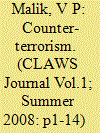

|
|
|
| 13 |
ID:
053312
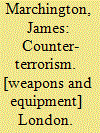

|
|
|
|
|
| Publication |
London, Brassey's, 2003.
|
| Description |
240p.
|
| Standard Number |
1857533860
|
|
|
|
|
|
|
|
|
|
|
|
Copies: C:1/I:0,R:0,Q:0
Circulation
| Accession# | Call# | Current Location | Status | Policy | Location |
| 048420 | 363.3202819/MAR 048420 | Main | On Shelf | General | |
|
|
|
|
| 14 |
ID:
123563
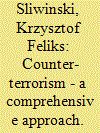

|
|
|
|
|
| Publication |
2013.
|
| Summary/Abstract |
The global war on terror and 9/11 have brought to our attention the perpetual problem of freedom versus security. The more governments strive to provide security, the more they tend to curb the freedoms of their citizens. 'Stop and search' procedures, 28-day detentions of terrorist suspects without charge or new body scanners at the airports are just the 'tip of the iceberg' in a long list of the state's encroachments into our private lives. This paper departs from such a seemingly inescapable predicament. It analyses the role of the public in preventing, protecting and preparing for terrorist attacks under the British government's counter-terrorism strategy known as CONTEST. It explores two social phenomena that are being increasingly promoted by official authorities in the United Kingdom, namely, mobilisation of society and what the author terms 'civilianisation' of security. The latter is defined as a notion relating to non-military, voluntary organisations and the business/private sector, engaged by government but acting in its own right against terrorism threats. 'Civilianisation' of security is also conceived of as a potential tool to bridge the gap between two incompatible worlds of state security and personal freedoms.
|
|
|
|
|
|
|
|
|
|
|
|
|
|
|
|
| 15 |
ID:
116195
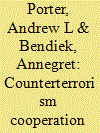

|
|
|
|
|
| Publication |
2012.
|
| Summary/Abstract |
While the notion of a European security community encounters little resistance in the security community literature, the transatlantic security community, comprised of the European Union (EU) and United States of America (USA), has suffered routine criticism in the aftermath of 9/11. This article seeks to lend empirical support to the claim that the transatlantic security community is alive and well, though not without its political arrhythmias. Drawing on the idea that community membership enhances norm convergence, this article examines the process of norm convergence in EU-US counterterrorism cooperation. We argue that the recent EU-US agreements on Passenger Name Records and the Terrorist Finance Tracking Programme represent a form of cooperation, that is, the convergence of values, which is essential for late-stage security community integration. Detainee practices, however, represent a harder case for the transatlantic security community. Despite these difficulties, we argue that this controversy does not preclude a priori the possibility of agreement. Although these transatlantic differences might shake the foundations of the EU security community, we argue that the current controversies provide an opportunity for the EU to reaffirm its commitment to its values, thus reinforcing its foundations as an independent security community. This account of cooperation, political disagreement notwithstanding, upsets the Kaganian account of transatlantic relations.
|
|
|
|
|
|
|
|
|
|
|
|
|
|
|
|
| 16 |
ID:
132322
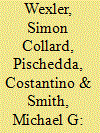

|
|
|
|
|
| Publication |
2014.
|
| Summary/Abstract |
The phenomenon of suicide attacks has dramatically expanded over the last twenty years, rising from no events in 1980 to a total of 1,398 events by 2008. A prominent theory has argued that suicide attacks are a coercive strategy aimed at ending foreign military occupation by democracies. Yet these conclusions are based on a research design that is affected by selection bias and that fails to distinguish foreign occupations from cases of groups seeking independence or autonomy, which we term domestic occupations. Analyzing an original data set that distinguishes the different types of occupation, we find that only foreign occupations have a strong and consistent effect on the incidence of suicide attacks. The reason, we argue, is that suicide attacks only become cost effective when targets are both hardened and accessible, a strategic environment that is more common to civil wars and foreign occupations than to domestic occupations.
|
|
|
|
|
|
|
|
|
|
|
|
|
|
|
|
| 17 |
ID:
112736
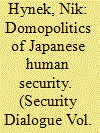

|
|
|
|
|
| Publication |
2012.
|
| Summary/Abstract |
Japan's approach to human security has commonly been regarded as progressive, imbued with liberal internationalist commitment. In this article, I offer an alternative and critical perspective on Japanese human security, arguing that the mainstream understanding neglects some important features of the phenomenon. I pay attention to the tight links between Japanese discourses and practices of international development and humanitarian assistance, refugee policy, counter-terrorism, and NGO regulation. So far, these issue areas have only been examined separately in the literature, thereby obscuring the strong affinities of human security to national security and non-liberal bureaucratic control. I argue that once the international and the domestic sides of Japanese human security are studied together, the approach can no longer be understood as resting on a combination of liberal values and 'Asian' values. Instead, it needs to be studied through a domopolitical diagram concerned with national security - that is, governance in the image of the home, linking citizenship, state and territory. After an initial discussion of the notion of domopolitics and its conceptual extension to the Japanese context, the article investigates the domopolitical relationship between Japanese human security as practised in Afghanistan and Japan's domestic refugee policy. It continues by examining the emergence of juridico-bureaucratic administration of NGOs within the domestic context and its subsequent extension to the area of Japanese human security, before ending with a few concluding remarks.
|
|
|
|
|
|
|
|
|
|
|
|
|
|
|
|
| 18 |
ID:
111539
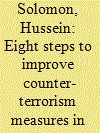

|
|
|
|
|
| Publication |
2012.
|
| Summary/Abstract |
In recent years, South Africa has come to be used by international terrorists as a safe house, for paramilitary training purposes, as a base from which to plan attacks on other countries and as a conduit for financial transactions. South Africa's own counter-terrorism initiatives have been labelled 'reactive' by analysts. Indeed, the existing counter-terrorism regime suffers from a lack of political will to issues of corruption and ineptitude bedevilling the security apparatus of the state. However, using lessons learned from other countries, Pretoria can yet turn the tide against international terrorism by adopting more pro-active measures and by undertaking steps aimed at the depoliticisation and decriminalisation of the security forces.
|
|
|
|
|
|
|
|
|
|
|
|
|
|
|
|
| 19 |
ID:
093778
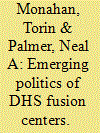

|
|
|
|
|
| Publication |
2009.
|
| Summary/Abstract |
This article explores public concerns about the US Department of Homeland Security's data 'fusion centers'. These centers, which are proliferating across all US states, coordinate data-sharing among state and local police, intelligence agencies, and private companies. The primary goal of fusion centers is to engage in intelligence-sharing for counter-terrorism purposes. However, they have been used for a variety of other purposes, such as basic policing, spying on social movement organizations, or restricting legal public activities such as taking photographs. Drawing upon a comprehensive analysis of media publications from 2002 to 2008, we identify and discuss three primary categories of concern with fusion centers: (1) their ineffectiveness, particularly given the financial expense, the statistical unlikelihood of terrorist attacks, and the pressing need for other law enforcement support; (2) the potential for mission creep, where the functions of fusion centers expand beyond their originally intended purposes to encompass things like all-hazards preparedness; and (3) the violation of civil liberties, especially through racial profiling or First Amendment violations.
|
|
|
|
|
|
|
|
|
|
|
|
|
|
|
|
| 20 |
ID:
128238
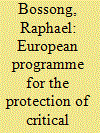

|
|
|
|
|
| Publication |
2014.
|
| Summary/Abstract |
Critical infrastructure protection (CIP) constitutes a paradigmatic as well as challenging case for EU security governance, which has received limited academic attention to date. This article draws on a heuristic framework to survey the EU's capacities to 'meta-govern', that is, to stimulate and steer governance efforts across multiple sectoral and political divides, in this complex issue area. The main part of the paper assesses the European Programme for Critical Infrastructure Protection (EPCIP), which comprises a variety of policy instruments and initiatives, on this basis. It is shown that the attempt of an authoritative regulation of European critical infrastructures has remained narrow and of questionable effectiveness. Scientific networks have developed more dynamically, while the participation of private companies and corresponding EU financial instruments are yet to show their potential. Finally, the EU's organizational capacity in CIP suffers from a lack of coordination structures in the European Commission, but also needs to take the scarcely known Joint Research Centre (JRC) into account. The conclusions highlight the barriers to comprehensive governance of as well as large research gaps on European critical infrastructure policies
|
|
|
|
|
|
|
|
|
|
|
|
|
|
|
|
|
|
|
|
|